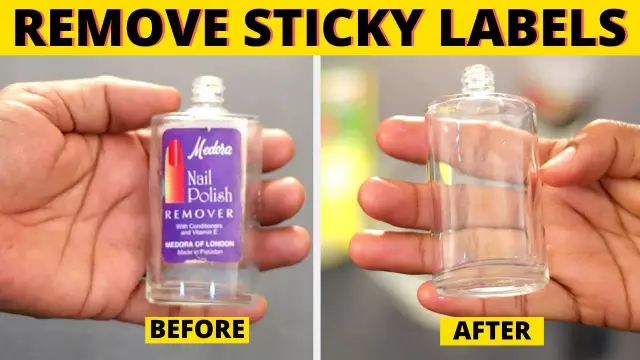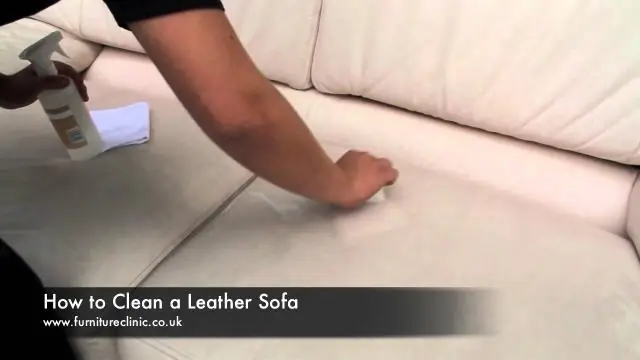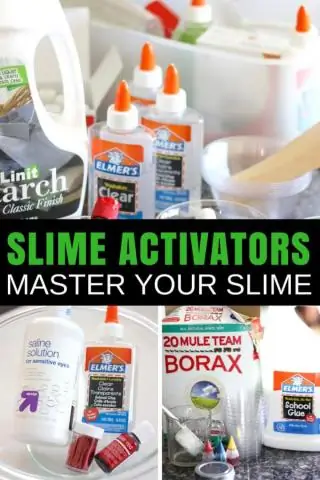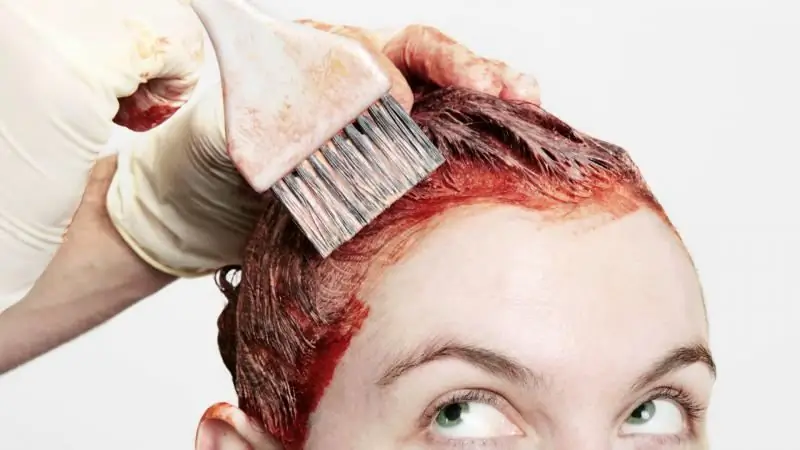
Table of contents:
- It is possible to wipe off the adhesive from the adhesive tape
- Table: what types of tape exist
- We clean the traces of glue from the usual, painting, double-sided
- How to remove adhesive tape from metal
- Getting rid of traces of glue on plastic surfaces
- How to wash natural or synthetic fabrics
- If adhesive remains on the upholstery or carpet surface
- Removing the remnants of the crayon tape from linoleum
- Removing the dried sticky mark from a wooden surface
- If the remains of adhesive tape on the surface of the laminated chipboard and polish?
- We clean glasses and mirrors from scotch marks
- How to remove the remainder of the tape from the rubber
- How to remove adhesive marks from wallpaper?
- How to clean a surface painted with water-based paint?
- Author Bailey Albertson albertson@usefultipsdiy.com.
- Public 2023-12-17 12:53.
- Last modified 2025-01-23 12:41.
It is possible to wipe off the adhesive from the adhesive tape

Scotch tape is a useful adhesive tape that is often used in the household for joining various parts, gluing broken things, but even despite its convenience, it leaves unpleasant traces that attract villi, dust and dirt that we want to get rid of. It is quite simple to wipe off traces of glue from the tape, you just need to follow the instructions and tips. Despite the fact that there are a lot of types of adhesive tape, they are united by the same feature: an acrylic base, less often a rubber base. This means that the choice of an effective remedy depends on the material of the surface on which traces remain - plastic, stainless steel, wood, glass or linoleum.
Before you start cleaning up the unpleasant adhesive layer, you should understand the types of adhesive tape that leave a mark (this is not a problem with every adhesive tape). If we “know the enemy by sight”, it is easier for us to cope with it.
Consider which adhesive tape leaves marks and which does not.
Content
- 1 Table: what types of adhesive tape exist
- 2 We clean the traces of glue from the usual, painting, double-sided
-
3 How to remove traces of adhesive from adhesive tape from metal
- 3.1 Cleaning with oil
- 3.2 How to wipe off with solvent
-
4 Get rid of traces of glue on plastic surfaces
- 4.1 Eraser cleans plastic
- 4.2 Which solvents are suitable
- 4.3 Exposing the adhesive spot to heat
- 4.4 Scotch tape - scotch tape
- 4.5 Video: we clean plastic windows from traces of adhesive tape
-
5 How to wash natural or synthetic fabrics
- 5.1 Alcohol or acetone
- 5.2 Soap solution, washing powder or soda solution
- 5.3 Washing machine
-
6 If adhesive remains on the upholstery or carpet surface
- 6.1 Special carpet cleaner
- 6.2 Solvents
-
7 Remove the remnants of the crayon tape from linoleum
7.1 Video: how to clean linoleum from scotch tape
-
8 Removing the dried sticky mark from a wooden surface
- 8.1 The safest way is oil
- 8.2 Kitchen cleaner
- 8.3 Eraser
-
9 If the remains of the adhesive tape on the surface of the laminated chipboard and polish?
9.1 Video: getting rid of glue on furniture
-
10 We clean glasses and mirrors from scotch marks
10.1 Video: how to remove tape from glass
- 11 How to remove the remainder of the tape from the rubber
- 12 How to remove adhesive marks from wallpaper?
- 13 How to clean a surface painted with water-based paint?
Table: what types of tape exist
| Type of scotch tape | How is it used | Base type | Does it leave traces? |
| Stationery adhesive tape | In offices, shops and schools for gluing paper and cardboard | Acrylic | No |
| Packing tape | In production for packaging products | Acrylic | Yes |
| Colored tape | In production for labeling different products in the same packaging boxes | Acrylic | Yes |
| Scotch tape with logo | In production facilities as an additional advertising medium | Acrylic | No |
| Masking tape (crepp) | To protect the surface from construction work | Rubber | No |
| Reinforced adhesive tape | For various renovations, waterproof | Rubber | Yes |
| Double-sided tape | Bonds two items together | Acrylic | Yes |
| Mounting rubber thick tape | For attaching plexiglass | Acrylic | No |
We clean the traces of glue from the usual, painting, double-sided
Traces of rubber-based adhesives and any “fresh” marks are most easily removed. For each type of adhesive tape that leaves marks, there is a way to remove them.

Rubber based tape is easier to remove
How to remove adhesive tape from metal
Cleaning with oil
On metal surfaces, traces of adhesive tape based on acrylic most often remain. One of the easiest and most straightforward ways to use is to remove the glue with vegetable oil. The oil contains fats that can change the properties of the glue and reduce its stickiness. A small piece of cotton wool is moistened with any fatty vegetable oil (sunflower or mustard oil, olive), applied to the glue line for a couple of minutes and rubbed off with slight pressure. You can pour oil directly on the dirty surface itself and put an unnecessary piece of cloth on top (in this case, you will need to wait several hours, but the glue will be easier to wipe off without applying any effort). The surface after the oil should be washed with a solution of soap or soda.
How to wipe off with solvent
Solvents such as alcohol or vodka, acetone, apple cider vinegar or grape vinegar, window cleaner, nail polish remover or White Spirit thinner will help to get rid of traces of duct tape on painted metal (from a stove, hood or refrigerator). These same substances work well with sticky marks on tiles, ceramic surfaces, mirrors and glass products.
It is possible to remove scotch tape residues from stainless steel using a dry cleaning agent - such as Pemolux kitchen powder (or Cif) and a stainless steel sponge.
Getting rid of traces of glue on plastic surfaces
Plastic surrounds us in an apartment or house everywhere - these are window frames, furniture, and toys for children. When preparing for cleaning, the quality of the plastic should be objectively assessed; a good material should withstand even aggressive agents. It is also necessary to take into account the cleaning time - it is much longer and more difficult to wipe off the adhesive tape, which has become old.
Eraser cleans plastic
An ordinary stationery eraser can save you from glue marks, motes from it are brushed off the plastic surface with a damp soft cloth. This method can be used for cleaning electrical equipment, children's toys, furniture and plastic windows from adhesive tape. However, if the surface is very large, you will need a lot of time and patience.

The eraser is suitable for cleaning plastic surfaces
What solvents are suitable
You can use the same products you used for metal cleaning, or unrefined gasoline for lighters, but before doing this, it is best to test them on a small area of the plastic surface you would like to clean.
Not all plastic reacts equally well to White Spirit, vodka or alcohol, some may lose their top coat or gloss, while others are prone to light spots.
Exposing the glue spot to heat
Old glue is the hardest thing to wipe off the plastic, you can "warm it up" a little to make things easier. To do this, you need to use a hair dryer, which will soften the glue mass, or a table lamp. After such manipulations, the adhesive trail “quickly comes into contact” with other detergents (for example, soapy water).
Scotch tape - scotch tape
Not too old tape marks can be cleaned … with another adhesive tape. It should be of better quality so as not to "plant" new tracks on the surface. You need to glue a new piece of duct tape onto the old track and tear it off vigorously, repeat this until traces of the old glue remain on the plastic surface.
Video: we clean plastic windows from traces of adhesive tape
How to wash natural or synthetic fabrics
As soon as you find traces of the adhesive base of the adhesive tape on the fabrics, start acting immediately, until the glue has hardened and absorbed into the fibers of the fabric.
Alcohol or acetone
It is necessary to moisten a cotton swab or a cotton pad folded in half with a solvent (act with its corner) and wipe the dirty track. Thinner can be used on strong, shedding fabrics, but is not at all suitable for printed or patterned fabrics, dyed fabrics and delicate fabrics.

Acetone dissolves the adhesive base from the tape
Soap solution, laundry detergent, or baking soda solution
You need to soak the clothes for half an hour or an hour, and then rinse, first of all paying attention to the areas with traces of adhesive tape, carefully removing the glue from the fabric with your hands.
Washing machine
Try washing your clothes in the washing machine, setting it to a specific mode for each specific type of fabric. It is advisable not to set the spin program after washing - this way you will have the opportunity to check whether the adhesive tape remains on the surface of the fabric or not.
Gasoline, kerosene, as well as other oil-based solvents leave persistent greasy stains on fabrics, so it is not recommended to use them to remove scotch tape from clothes.
If adhesive remains on the upholstery or carpet surface
Special Carpet Cleaner
You can use a special carpet cleaner - Help, Vanish or a Vox Drop, and keep it in the dirty area a little longer than recommended by the manufacturer for regular carpet cleaning.
Solvents
Upholstery can be treated with acetone, then wiped with a cloth dampened with soapy water.
Removing the remnants of the crayon tape from linoleum
Any cleaning powder is suitable for this, for example, Pemoxol.

Pemoxol - cleaning powder, cleans surfaces from traces of glue
Video: how to clean linoleum from scotch tape
Removing the dried sticky mark from a wooden surface
Wood surfaces are very delicate and therefore must be handled with great care. Often, when cleaning wood, they use fat-based products (vegetable oils and even mayonnaise)
The most gentle way is oil
You can use vegetable oil or baby massage oil. Before using it, be sure to try on the inside of the leg.
Means for the kitchen
For cleaning wooden surfaces, use Cif Kitchen Cream, a gel-like thick liquid of soft cream color.
Eraser
Washing gum is also suitable for cleaning delicate surfaces. The stains left after the eraser must be wiped off with a dry soft cloth, then the shine will return to the furniture.
If the remains of adhesive tape on the surface of the laminated chipboard and polish?
Soap solution, dishwashing detergent, shaving foam, vegetable oil will help to remove adhesive tape from furniture with a polished surface.
You can clean chipboard furniture with White Spirit thinner.
Video: getting rid of glue on furniture
We clean glasses and mirrors from scotch marks
For this purpose, you can use a special window cleaner, alcohol or acetone, nail polish remover. To clean the traces of tape, the mirrors can be applied to the dirty area with a sponge soaked in hot water, wait a few seconds, and wipe with a dry soft cloth. You can use vegetable oil.

Removing tape from glass and mirror surfaces is not too difficult
Video: how to remove adhesive tape from glass
How to remove the remainder of the tape from the rubber
A good rubber cleaner is the familiar Coca-Cola, as well as solvents such as White Spirit or 646. As with cleaning mirrors, hot water and then a dry thick cloth can help.
How to remove adhesive marks from wallpaper?
If the wallpaper is silk or vinyl, non-fibrous and dense, there are usually no scotch marks left on it. This happens more often with paper wallpapers. To clean them, the surface of the wallpaper needs to be warmed up using a hair dryer or a table lamp. Another option is to use a soft, heavy cloth and iron. It is necessary to heat the iron and run it several times through the cloth applied to the area soiled with tape. The adhesion of the adhesive backing to the wallpaper will decrease and the adhesive will be easier to peel off.
How to clean a surface painted with water-based paint?
Any alcohol-containing solution or hot water will help with this, since the water-based paint itself, unlike the adhesive base of any adhesive tape, is insensitive to the use of solvents and temperature changes.
It is not so difficult to cope with sticky marks from adhesive tape, it is only important to choose the most suitable method for the dirty surface and use it correctly. And then your furniture, clothes or wallpaper will be pleasantly clean and pleasing to the eye.
Recommended:
How And What To Wash The Blood From The Sofa, Mattress, Upholstered Furniture And Other Items In The Apartment + Photos And Videos

Blood stains can ruin various types of surfaces. We will tell you how to remove them from furniture, wallpaper, ceiling, as well as how to wash them off shoes with improvised means
How To Wipe A Pen From Leatherette Or Wash Ink From A Leather Sofa And Other Leather Items + Photos And Videos

Evaluation of the effectiveness of methods for removing stains from ballpoint, ink and gel pens from various things made of leather and leatherette, how to wipe: photo and video
How To Make A Slime At Home With Your Own Hands - Without Sodium Tetraborate And Glue, From Hand Cream, Shaving Foam And Other Ingredients, Recipes With Photos And Videos

Is it possible to make a slime at home. Types of slimes and recipes for their manufacture, depending on the desired properties. Toy care features
How To Wipe Hair Dye From The Skin Of The Face, Hands, Nails Or Other Parts Of The Body + Photos And Videos

Effective ways to wipe hair dye stains from nails, face and hands. Handy tools, proven recipes, and unsafe but popular drugs
How To Cook Frozen And Fresh Shrimp Correctly And How Much: Cooking Ordinary, Royal, Description Of Methods With Photos And Videos

Description of different methods of cooking shrimp: how and how long to cook fresh and frozen, on the stove, in a multicooker and microwave
